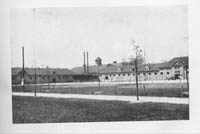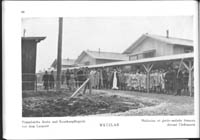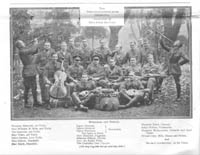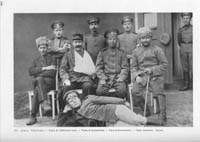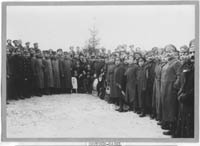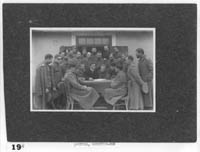Chapter 13
Filling the Breach: The Arrival of Neutral Secretaries in Central Europe
1
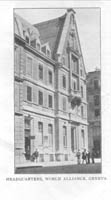 The YMCA now focused its full attention on acquiring Association secretaries from neutral countries to replace
the departed American secretaries in Germany. The World's Committee contacted the National YMCA Councils of the
Netherlands, Switzerland, Denmark, Norway, and Sweden to recruit experienced Red Triangle workers for War Prisoners' Aid (WPA) service
in Germany. These nations all had critical domestic social relief priorities, including welfare operations for
mobilized troops and refugees, and their national Associations were deeply committed to these activities. As a
result, the World's Alliance was only gradually able to secure neutral secretaries. Operations were also constrained
because, even if neutral Red Triangle workers agreed to work in Germany, the Ministry of War still had to accept them.
By June 1917, only three neutral secretaries had arrived in Germany to undertake WPA operations, well short of the
original American staff.
The YMCA now focused its full attention on acquiring Association secretaries from neutral countries to replace
the departed American secretaries in Germany. The World's Committee contacted the National YMCA Councils of the
Netherlands, Switzerland, Denmark, Norway, and Sweden to recruit experienced Red Triangle workers for War Prisoners' Aid (WPA) service
in Germany. These nations all had critical domestic social relief priorities, including welfare operations for
mobilized troops and refugees, and their national Associations were deeply committed to these activities. As a
result, the World's Alliance was only gradually able to secure neutral secretaries. Operations were also constrained
because, even if neutral Red Triangle workers agreed to work in Germany, the Ministry of War still had to accept them.
By June 1917, only three neutral secretaries had arrived in Germany to undertake WPA operations, well short of the
original American staff.
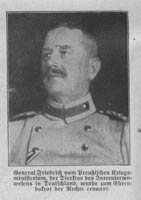 Under the September 1917 agreement between Conrad Hoffman and the Ministry of War, the Germans agreed to allow eleven
neutral secretaries, not including Hoffman, to provide services to Allied prisoners. But the recruitment drive for
neutral secretaries was slow, and the Association had only ten secretaries working by December. This delay caused
a serious loss of momentum in welfare work among the Allied prisoners. Changes in the German bureaucracy resulted in
new personnel whom the Association believed were hostile to WPA relief work. General Friedrich found this antagonism
difficult to overcome, but welfare work for Allied POWs continued. When neutral secretaries did manage to begin service, they could resume the full program of activities that the American secretaries had started, visiting main prison
camps and labor detachments. It was not until February 1918 that Hoffman had the same number of secretaries working in the field
as he had supervised a year earlier.1
Under the September 1917 agreement between Conrad Hoffman and the Ministry of War, the Germans agreed to allow eleven
neutral secretaries, not including Hoffman, to provide services to Allied prisoners. But the recruitment drive for
neutral secretaries was slow, and the Association had only ten secretaries working by December. This delay caused
a serious loss of momentum in welfare work among the Allied prisoners. Changes in the German bureaucracy resulted in
new personnel whom the Association believed were hostile to WPA relief work. General Friedrich found this antagonism
difficult to overcome, but welfare work for Allied POWs continued. When neutral secretaries did manage to begin service, they could resume the full program of activities that the American secretaries had started, visiting main prison
camps and labor detachments. It was not until February 1918 that Hoffman had the same number of secretaries working in the field
as he had supervised a year earlier.1
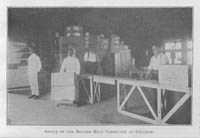 The World's Alliance recruited four of the neutral secretaries for WPA service in Germany from Denmark. The Danes
provided the largest number of secretaries for German WPA service during the war. Halfdan Høgsbro began work in
prison camps in December 1917, conducting visits in the XII Army Corps and the XIX Army Corps regions (Saxony),
the V Army Corps region (Posen), and the VI Army Corps region (Breslau, Silesia). He concentrated most of his
initial efforts in the prison camps surrounding Dresden, but shifted many activities to the facilities around
Frankfurt-am-Main in the XVIII Army Corps Bezirk (district) by August 1918.
The World's Alliance recruited four of the neutral secretaries for WPA service in Germany from Denmark. The Danes
provided the largest number of secretaries for German WPA service during the war. Halfdan Høgsbro began work in
prison camps in December 1917, conducting visits in the XII Army Corps and the XIX Army Corps regions (Saxony),
the V Army Corps region (Posen), and the VI Army Corps region (Breslau, Silesia). He concentrated most of his
initial efforts in the prison camps surrounding Dresden, but shifted many activities to the facilities around
Frankfurt-am-Main in the XVIII Army Corps Bezirk (district) by August 1918.
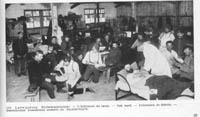 Hans O. Juhl started WPA work in November 1917, concentrating on the POW camps in the VII Army Corps region
(Münster). Marius Hansen began POW relief work at the same time as Høgsbro, in December 1917, and served
an extensive territory. While serving Allied prisoners, he visited prison camps in the XVII Army Corps (Danzig),
the XX Army Corps (Allenstein), and the XXI Army Corps (Saarbrücken) districts. The last Danish secretary,
Olaf Høyer, worked for Allied POWs in camps under the control of the II Army Corps (Stettin, Pomerania) and the IX
Army Corps (Altona, Schleswig-Holstein) in January 1918.2
Hans O. Juhl started WPA work in November 1917, concentrating on the POW camps in the VII Army Corps region
(Münster). Marius Hansen began POW relief work at the same time as Høgsbro, in December 1917, and served
an extensive territory. While serving Allied prisoners, he visited prison camps in the XVII Army Corps (Danzig),
the XX Army Corps (Allenstein), and the XXI Army Corps (Saarbrücken) districts. The last Danish secretary,
Olaf Høyer, worked for Allied POWs in camps under the control of the II Army Corps (Stettin, Pomerania) and the IX
Army Corps (Altona, Schleswig-Holstein) in January 1918.2
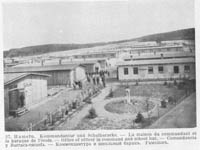 The Swedish National YMCA Council sent three secretaries to work in WPA operations in the German Empire during the
war. Emmanuel Diehl had begun operations by November 1917, and conducted relief work over a very large area in
southwestern Germany. He visited prison camps and labor detachments under the control of the XIII Army Corps
(Stuttgart), the XIV Army Corps region (Carlsruhe), and the XVIII Army Corps region (Frankfurt-am-Main). At the
same time Diehl began operations, Joseph Brenning also started visiting Allied prisoners. Brenning worked an
equally large area, serving the POWs in the IV Army Corps region (Magdeburg), the V Army Corps region (Posen),
and the VI Army Corps region (Breslau). He concentrated most of his efforts in eastern Germany, working primarily
out of Breslau. In addition, Paul Sjöberg worked for the WPA in northwestern Germany, visiting prisons in the
X Army Corps region (Hannover) by March 1918.3
The Swedish National YMCA Council sent three secretaries to work in WPA operations in the German Empire during the
war. Emmanuel Diehl had begun operations by November 1917, and conducted relief work over a very large area in
southwestern Germany. He visited prison camps and labor detachments under the control of the XIII Army Corps
(Stuttgart), the XIV Army Corps region (Carlsruhe), and the XVIII Army Corps region (Frankfurt-am-Main). At the
same time Diehl began operations, Joseph Brenning also started visiting Allied prisoners. Brenning worked an
equally large area, serving the POWs in the IV Army Corps region (Magdeburg), the V Army Corps region (Posen),
and the VI Army Corps region (Breslau). He concentrated most of his efforts in eastern Germany, working primarily
out of Breslau. In addition, Paul Sjöberg worked for the WPA in northwestern Germany, visiting prisons in the
X Army Corps region (Hannover) by March 1918.3
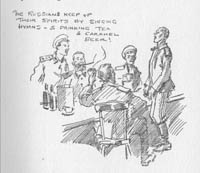 Three Swiss secretaries also signed up for WPA duty in Germany. Eduard Schaetti was among the first neutral
secretaries to arrive after the Americans left, beginning POW relief operations in July 1917. Schaetti worked an
extensive area in central Germany, including the Garde de Corps (Berlin), the III Army Corps region (Berlin), the
IV Army Corps (Magdeburg), and the XI Army Corps region (Cassel).
Three Swiss secretaries also signed up for WPA duty in Germany. Eduard Schaetti was among the first neutral
secretaries to arrive after the Americans left, beginning POW relief operations in July 1917. Schaetti worked an
extensive area in central Germany, including the Garde de Corps (Berlin), the III Army Corps region (Berlin), the
IV Army Corps (Magdeburg), and the XI Army Corps region (Cassel).
 Traveling extensively across this area, he concentrated much of his work at Erfurt, Zerbst, Münchberg,
and infamous Wittenberg, all within Prussia. Paul Arni accepted responsibility for prison camps in the kingdom
of Bavaria, beginning in January 1918.
Traveling extensively across this area, he concentrated much of his work at Erfurt, Zerbst, Münchberg,
and infamous Wittenberg, all within Prussia. Paul Arni accepted responsibility for prison camps in the kingdom
of Bavaria, beginning in January 1918.
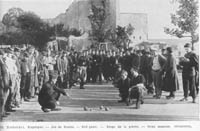 He ranged widely across southern Germany, working in prisons and work details under the control of the I Royal
Bavarian Army Corps (Munich), the II Royal Bavarian Army Corps (Würzburg), and the III Royal Bavarian Army
Corps (Nürnberg). During his service, he focused on prison camps near Munich, Würzburg, Nürnberg,
Augsburg, and Ulm. A third Swiss secretary, A. von Aesch, also participated in the WPA program in Germany during
the war.4
He ranged widely across southern Germany, working in prisons and work details under the control of the I Royal
Bavarian Army Corps (Munich), the II Royal Bavarian Army Corps (Würzburg), and the III Royal Bavarian Army
Corps (Nürnberg). During his service, he focused on prison camps near Munich, Würzburg, Nürnberg,
Augsburg, and Ulm. A third Swiss secretary, A. von Aesch, also participated in the WPA program in Germany during
the war.4
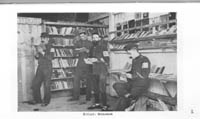 The Norwegian National YMCA Council, which had the least resources of all of the remaining neutral countries, sent two
secretaries to Germany for WPA service. Thorlief Boman began work in central Germany in March 1918.
The Norwegian National YMCA Council, which had the least resources of all of the remaining neutral countries, sent two
secretaries to Germany for WPA service. Thorlief Boman began work in central Germany in March 1918.
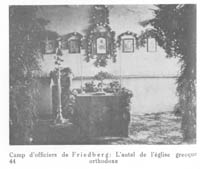 Hoffman assigned Boman to the XI Army Corps region (Cassel) with another Norwegian secretary, Hans O. Rögberg,
who concentrated his relief efforts on the XVIII Army Corps region (Frankfurt-am-Main) in central Germany. By early
1918, the YMCA had resumed welfare operations in the majority of prison camps in the empire. The Association had set
up relief work in twenty-one out of twenty-five Army Corps districts during the course of the war.
Hoffman assigned Boman to the XI Army Corps region (Cassel) with another Norwegian secretary, Hans O. Rögberg,
who concentrated his relief efforts on the XVIII Army Corps region (Frankfurt-am-Main) in central Germany. By early
1918, the YMCA had resumed welfare operations in the majority of prison camps in the empire. The Association had set
up relief work in twenty-one out of twenty-five Army Corps districts during the course of the war.
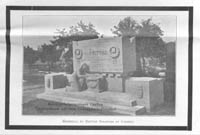 The four regions that did not receive YMCA attention-the I Army Corps Region, Königsberg; the VIII Army Corps
region, Coblenz; the XV Army Corps region, Strasbourg; and the XVI Army Corps region, Metz-were border provinces
with very few prison camps. East Prussia, Alsace, and Lorraine were too vulnerable to invasion by the Allies or
posed too tempting an environment for escape by Allied POWs, and the Germans preferred to locate their prisoners
deeper inside the empire.5
The four regions that did not receive YMCA attention-the I Army Corps Region, Königsberg; the VIII Army Corps
region, Coblenz; the XV Army Corps region, Strasbourg; and the XVI Army Corps region, Metz-were border provinces
with very few prison camps. East Prussia, Alsace, and Lorraine were too vulnerable to invasion by the Allies or
posed too tempting an environment for escape by Allied POWs, and the Germans preferred to locate their prisoners
deeper inside the empire.5
Neutral YMCA WPA Operations in Germany, February 1917-November 1918
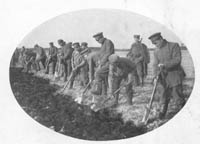 The interruption in Association services between the departure of the American WPA field secretaries and the arrival
of the neutral YMCA secretaries had a debilitating impact on POW relief services. It took several months to recruit
new secretaries and have them approved by the Ministry of War.
The interruption in Association services between the departure of the American WPA field secretaries and the arrival
of the neutral YMCA secretaries had a debilitating impact on POW relief services. It took several months to recruit
new secretaries and have them approved by the Ministry of War.
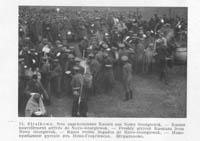 During this time, the Germans accumulated Allied prisoners and increased the number of men under the care of the
Prisoner of War Department. At the same time, the Allied blockade reduced both the quality and quantity of food
in Germany, and Eastern European prisoners suffered greatly.
During this time, the Germans accumulated Allied prisoners and increased the number of men under the care of the
Prisoner of War Department. At the same time, the Allied blockade reduced both the quality and quantity of food
in Germany, and Eastern European prisoners suffered greatly.
 When the neutral secretaries did arrive in the field, they still had many obstacles to overcome. They were inexperienced
in WPA work and had to learn the ropes. They also had to reestablish a trusting relationship with Allied prisoners and
German guards to conduct effective relief. In addition, the Germans continued to ship large numbers of POWs out of
the camps into labor detachments, where it was difficult for secretaries to provide services.6
When the neutral secretaries did arrive in the field, they still had many obstacles to overcome. They were inexperienced
in WPA work and had to learn the ropes. They also had to reestablish a trusting relationship with Allied prisoners and
German guards to conduct effective relief. In addition, the Germans continued to ship large numbers of POWs out of
the camps into labor detachments, where it was difficult for secretaries to provide services.6
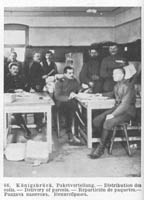 Due to the deteriorating food situation in Germany, physical relief remained a top priority for the WPA program
after the American secretaries left. While British, French, and Belgian prisoners received their food parcels
uninterrupted, the condition of the Russian, Serbian, Romanian, and Italian POWs worsened with time.
Due to the deteriorating food situation in Germany, physical relief remained a top priority for the WPA program
after the American secretaries left. While British, French, and Belgian prisoners received their food parcels
uninterrupted, the condition of the Russian, Serbian, Romanian, and Italian POWs worsened with time.
 The Association knew that for the WPA program to work, the YMCA would have to provide these prisoners with food.
While the Association hoped for the implementation of a comprehensive food program through the Joint POW Food Relief
Committee, that plan eventually collapsed, and the YMCA had to focus its meager resources on specific targets. As a
result, Hoffman decided to supplement hospital food for indigent sick and wounded prisoners in German military
hospitals.
The Association knew that for the WPA program to work, the YMCA would have to provide these prisoners with food.
While the Association hoped for the implementation of a comprehensive food program through the Joint POW Food Relief
Committee, that plan eventually collapsed, and the YMCA had to focus its meager resources on specific targets. As a
result, Hoffman decided to supplement hospital food for indigent sick and wounded prisoners in German military
hospitals.
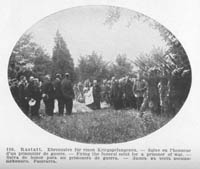 This program was strongly supported by Crown Princess Margaret of Sweden. The Swedes sent scores of medical chests
to POW hospitals to augment scarce supplies, including essential drugs. The Crown Princess also sent money that
allowed YMCA secretaries to purchase hens for fresh eggs, and condensed milk for invalid POWs in the hospital.
This program was strongly supported by Crown Princess Margaret of Sweden. The Swedes sent scores of medical chests
to POW hospitals to augment scarce supplies, including essential drugs. The Crown Princess also sent money that
allowed YMCA secretaries to purchase hens for fresh eggs, and condensed milk for invalid POWs in the hospital.
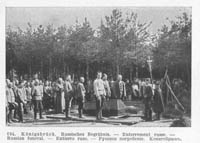 During the winter of 1917, secretaries distributed one pound of apples each to ten thousand prisoners during hospital
calls. As a Christmas gift in December 1917, Red Triangle workers visited the hospital wards and handed out eleven thousand
tins of condensed milk, thirty-one thousand pounds of biscuits, eleven thousand jars of beef extract, and 325,000 cigarettes. In
addition, the Association provided physical therapy equipment for invalid POWs. The YMCA sent a special
apparatus designed to loosen stiff joints as part of the rehabilitation process.7
During the winter of 1917, secretaries distributed one pound of apples each to ten thousand prisoners during hospital
calls. As a Christmas gift in December 1917, Red Triangle workers visited the hospital wards and handed out eleven thousand
tins of condensed milk, thirty-one thousand pounds of biscuits, eleven thousand jars of beef extract, and 325,000 cigarettes. In
addition, the Association provided physical therapy equipment for invalid POWs. The YMCA sent a special
apparatus designed to loosen stiff joints as part of the rehabilitation process.7
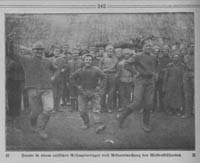 Despite the Association's best efforts, Russian POWs suffered the most. The overthrow of the Provisional Government
in November 1918 made a bad situation even worse. The new Bolshevik government, seeking to consolidate domestic power,
promised the Russian people, "Land, peace, and bread!" Continuing to fight for capitalist goals only weakened the
Bolsheviks' program, and they sued for peace with the Central Powers. After months of negotiations, the Bolsheviks
signed the Treaty of Brest-Litovsk in March 1918, which ended Russian participation in the war. Most Russian prisoners expected
to be repatriated with the signing of the treaty, but the vast majority had to wait in German prison camps until
the end of the larger conflict. While their hopes of an early release were dashed, the Russian POWs received another
blow from an unexpected direction. After the signing of the treaty, the Loan Trade Board of the U.S. government
forbid the extension of all physical relief to Russian prisoners. This decision increased the distress of hundreds
of thousands of Russians, both Whites and Bolsheviks. 8
Despite the Association's best efforts, Russian POWs suffered the most. The overthrow of the Provisional Government
in November 1918 made a bad situation even worse. The new Bolshevik government, seeking to consolidate domestic power,
promised the Russian people, "Land, peace, and bread!" Continuing to fight for capitalist goals only weakened the
Bolsheviks' program, and they sued for peace with the Central Powers. After months of negotiations, the Bolsheviks
signed the Treaty of Brest-Litovsk in March 1918, which ended Russian participation in the war. Most Russian prisoners expected
to be repatriated with the signing of the treaty, but the vast majority had to wait in German prison camps until
the end of the larger conflict. While their hopes of an early release were dashed, the Russian POWs received another
blow from an unexpected direction. After the signing of the treaty, the Loan Trade Board of the U.S. government
forbid the extension of all physical relief to Russian prisoners. This decision increased the distress of hundreds
of thousands of Russians, both Whites and Bolsheviks. 8
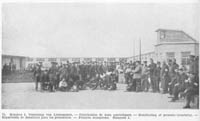 A similar problem emerged regarding the transmission of money from families and friends to prisoners, another
important form of physical relief. In June 1917, the YMCA cabled 185,000 Marks to German POWs in Russia, while
Russian families sent 108,000 Marks to Russian prisoners in Germany via the WPA Office in Petrograd.
A similar problem emerged regarding the transmission of money from families and friends to prisoners, another
important form of physical relief. In June 1917, the YMCA cabled 185,000 Marks to German POWs in Russia, while
Russian families sent 108,000 Marks to Russian prisoners in Germany via the WPA Office in Petrograd.
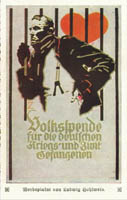 The Association had established an extremely efficient system for transferring funds, and the Red Cross approached
the YMCA with a request for the Association to set up a similar system for them in Russia. Red Triangle workers
continued to provide information about the health and whereabouts of missing POWs to concerned family members. Despite
the importance of this work, the War Trade Board placed restrictions on the transmission of money and information
between Germany and Russia before the Armistice.9
The Association had established an extremely efficient system for transferring funds, and the Red Cross approached
the YMCA with a request for the Association to set up a similar system for them in Russia. Red Triangle workers
continued to provide information about the health and whereabouts of missing POWs to concerned family members. Despite
the importance of this work, the War Trade Board placed restrictions on the transmission of money and information
between Germany and Russia before the Armistice.9
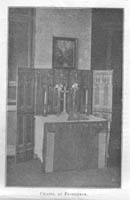 With the collapse of physical relief under the weight of bureaucratic and logistical burdens, WPA secretaries had to
focus on mental relief efforts. The YMCA continued to provide books, educational material, musical instruments, sports
equipment, theatrical props, and arts and crafts to provide psychological diversions for the prisoners.
With the collapse of physical relief under the weight of bureaucratic and logistical burdens, WPA secretaries had to
focus on mental relief efforts. The YMCA continued to provide books, educational material, musical instruments, sports
equipment, theatrical props, and arts and crafts to provide psychological diversions for the prisoners.
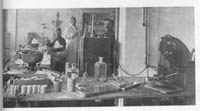 The goal of WPA field secretaries was to save the minds (and lives) of as many POWs in Germany as possible. The key
to this strategy was personal visits by neutral secretaries. By June 1917, the new Red Triangle workers had begun to
resume Association activities. Most large prison camps had YMCA halls, which featured reading rooms, libraries,
theaters, schools, and churches.
The goal of WPA field secretaries was to save the minds (and lives) of as many POWs in Germany as possible. The key
to this strategy was personal visits by neutral secretaries. By June 1917, the new Red Triangle workers had begun to
resume Association activities. Most large prison camps had YMCA halls, which featured reading rooms, libraries,
theaters, schools, and churches.
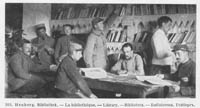 Supplying reading matter remained a high priority for Hoffman and the YMCA. By June 1917, every prison camp in
Germany had a library, ranging from scores of books to four thousand volumes. In addition, the WPA office in Berlin filled
seventeen thousand individual orders for books, a service that continued for the duration of the war.
Supplying reading matter remained a high priority for Hoffman and the YMCA. By June 1917, every prison camp in
Germany had a library, ranging from scores of books to four thousand volumes. In addition, the WPA office in Berlin filled
seventeen thousand individual orders for books, a service that continued for the duration of the war.
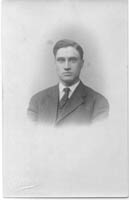 The Russians again suffered the most from the lack of books. By June 1917, Princess Helen of Altenburg provided
the WPA with 434,000 books and pamphlets for Russian prisoners and Red Triangle libraries. Edgar MacNaughten, the
former American WPA Senior Secretary for Austria-Hungary, traveled to Bern to set up a Russian-language press for
the YMCA.
The Russians again suffered the most from the lack of books. By June 1917, Princess Helen of Altenburg provided
the WPA with 434,000 books and pamphlets for Russian prisoners and Red Triangle libraries. Edgar MacNaughten, the
former American WPA Senior Secretary for Austria-Hungary, traveled to Bern to set up a Russian-language press for
the YMCA.
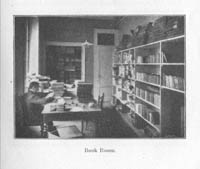 He hired twenty-five Russian writers in Switzerland to write and translate books. The distribution of books remained
an important Association service, even more so than their production. During a two-month period in the spring of
1917, the YMCA sent sixty-eight thousand books to German POWs in Allied countries, fourteen thousand books to guards in German prison
camps, and 117,000 books to Allied POWs in Germany.10
He hired twenty-five Russian writers in Switzerland to write and translate books. The distribution of books remained
an important Association service, even more so than their production. During a two-month period in the spring of
1917, the YMCA sent sixty-eight thousand books to German POWs in Allied countries, fourteen thousand books to guards in German prison
camps, and 117,000 books to Allied POWs in Germany.10
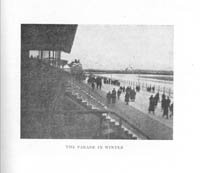 Despite the immediate needs of Eastern European prisoners for physical relief, Red Triangle workers continued to
develop the WPA's education program. Prisoners from Russia, Serbia, and Romania did not receive food parcels on a
regular basis, and many faced the potential of starvation. The YMCA, unfortunately, had limited physical relief
resources, and could do nothing but maintain the educational component of the Association program.
Despite the immediate needs of Eastern European prisoners for physical relief, Red Triangle workers continued to
develop the WPA's education program. Prisoners from Russia, Serbia, and Romania did not receive food parcels on a
regular basis, and many faced the potential of starvation. The YMCA, unfortunately, had limited physical relief
resources, and could do nothing but maintain the educational component of the Association program.
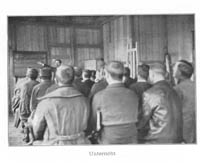 The WPA Office in Berlin provided supplies and equipment including paper, pencils, black boards, chalk, charts,
maps, globes, textbooks, notebooks, rulers, drawing materials, multigraphs, paints, and typewriters. The education
program became increasingly difficult to coordinate, however, with the departure of soldiers on Arbeitskommandos
and the onset of acute hunger. Some camps established effective school systems. Ruhleben offered an excellent
education program, with the Grandstand University as the camp's centerpiece. The faculty offered classes in chemistry,
electricity, physics, biology, engineering, bridge building, fine arts, and vocal and instrumental music.
The WPA Office in Berlin provided supplies and equipment including paper, pencils, black boards, chalk, charts,
maps, globes, textbooks, notebooks, rulers, drawing materials, multigraphs, paints, and typewriters. The education
program became increasingly difficult to coordinate, however, with the departure of soldiers on Arbeitskommandos
and the onset of acute hunger. Some camps established effective school systems. Ruhleben offered an excellent
education program, with the Grandstand University as the camp's centerpiece. The faculty offered classes in chemistry,
electricity, physics, biology, engineering, bridge building, fine arts, and vocal and instrumental music.
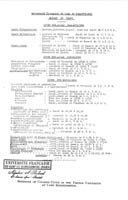 Students at the school received credit from English universities for their work. Prisoners at Göttingen enjoyed
similar classes at the university in their camp. Association secretaries could support advanced students in other
ways. Neutral YMCA workers borrowed books from the royal libraries in Berlin, Dresden, Leipzig, and Munich. Serbian
prisoners became some of the most enthusiastic students at YMCA schools, and Serbian officers taught many illiterate
enlisted men to read. Serbian POWs could take a variety of other classes including popular science, current events,
and English, French, and Russian classes.11
Students at the school received credit from English universities for their work. Prisoners at Göttingen enjoyed
similar classes at the university in their camp. Association secretaries could support advanced students in other
ways. Neutral YMCA workers borrowed books from the royal libraries in Berlin, Dresden, Leipzig, and Munich. Serbian
prisoners became some of the most enthusiastic students at YMCA schools, and Serbian officers taught many illiterate
enlisted men to read. Serbian POWs could take a variety of other classes including popular science, current events,
and English, French, and Russian classes.11
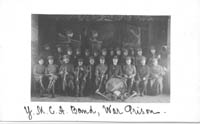 The neutral secretaries also maintained the social component of the Association program. Musical entertainment was
a critical element of this relief. By June 1917, the YMCA had equipped twenty-seven orchestras in prison camps and provided
harmonicas to 120 labor detachments.
The neutral secretaries also maintained the social component of the Association program. Musical entertainment was
a critical element of this relief. By June 1917, the YMCA had equipped twenty-seven orchestras in prison camps and provided
harmonicas to 120 labor detachments.
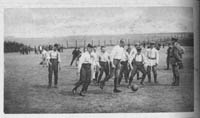 To meet the heavy demand for instruments, the Association developed a business relationship with a musical instrument
manufacturer in Leipzig. The relationship evidently flourished, since the WPA Office in Berlin received a single bill
for 504 mouth organs. Red Triangle workers provided sheet music and orchestral scores upon request.
To meet the heavy demand for instruments, the Association developed a business relationship with a musical instrument
manufacturer in Leipzig. The relationship evidently flourished, since the WPA Office in Berlin received a single bill
for 504 mouth organs. Red Triangle workers provided sheet music and orchestral scores upon request.
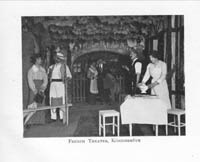 This office also continued the circulation of gramophones and record sets. By December 1917, the Berlin office had
forty series of phonograph record sets in circulation; this number had increased to sixty series by March 1918 to
meet increased demand. The replacement WPA secretaries also supported other aspects of the social program, including
theatrical productions and athletic contests.
This office also continued the circulation of gramophones and record sets. By December 1917, the Berlin office had
forty series of phonograph record sets in circulation; this number had increased to sixty series by March 1918 to
meet increased demand. The replacement WPA secretaries also supported other aspects of the social program, including
theatrical productions and athletic contests.
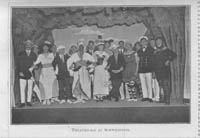 Between 1 May 1918 and 1 September 1918, the WPA Office in Berlin shipped out two hundred sports outfits, 691 musical
instruments, 3,861 games, eighty-seven gramophones, 7,500 books, and 164 medical chests to POW camps across Germany. The
YMCA also promoted camp beautification programs-the one implemented at Ruhleben was especially noteworthy-to help
prisoners pass the time through wholesome hobbies. The Association provided flower and vegetable seeds, and the
POWs planted gardens around the camp, and grew potted plants to make hospital wards more cheerful. The Association
also conducted a contest at Königsbrück, where POWs submitted designs for a cemetery memorial to
remember fallen prisoners.12
Between 1 May 1918 and 1 September 1918, the WPA Office in Berlin shipped out two hundred sports outfits, 691 musical
instruments, 3,861 games, eighty-seven gramophones, 7,500 books, and 164 medical chests to POW camps across Germany. The
YMCA also promoted camp beautification programs-the one implemented at Ruhleben was especially noteworthy-to help
prisoners pass the time through wholesome hobbies. The Association provided flower and vegetable seeds, and the
POWs planted gardens around the camp, and grew potted plants to make hospital wards more cheerful. The Association
also conducted a contest at Königsbrück, where POWs submitted designs for a cemetery memorial to
remember fallen prisoners.12
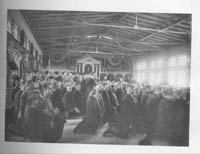 Most importantly, the YMCA supported the religious component of the WPA program. Secretaries provided all possible
assistance to religious leaders in the prison camps. Association workers offered divine services and evangelistic
meetings for Protestant prisoners, while Russian Orthodox POWs received religious articles and Scriptures.
Most importantly, the YMCA supported the religious component of the WPA program. Secretaries provided all possible
assistance to religious leaders in the prison camps. Association workers offered divine services and evangelistic
meetings for Protestant prisoners, while Russian Orthodox POWs received religious articles and Scriptures.
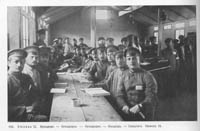 The WPA Office in Berlin provided Orthodox priests with wheat flour for Holy Communion, altar candles, incense,
prayer books, ritual service books, hymnals, altar pictures, icons, oil, church music, ritual vessels, communion
wine, and robes and vestments. The neutral secretaries handed out two hundred thousand crosses and icons from the Holy Synod to
Orthodox POWs, plus eight thousand small pictures.
The WPA Office in Berlin provided Orthodox priests with wheat flour for Holy Communion, altar candles, incense,
prayer books, ritual service books, hymnals, altar pictures, icons, oil, church music, ritual vessels, communion
wine, and robes and vestments. The neutral secretaries handed out two hundred thousand crosses and icons from the Holy Synod to
Orthodox POWs, plus eight thousand small pictures.
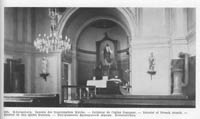 The YMCA also distributed Slavic Bibles, parts of the Scriptures, and other religious books for studying and reading.
The German authorities also supported religious work. Members of the German clergy promoted the development of spiritual
interests in prison camps and presided over special religious ministrations, such as communion services or burials,
whenever possible. The Association also assisted Jewish rabbis conduct services for the solace of Hebrew
prisoners.13
The YMCA also distributed Slavic Bibles, parts of the Scriptures, and other religious books for studying and reading.
The German authorities also supported religious work. Members of the German clergy promoted the development of spiritual
interests in prison camps and presided over special religious ministrations, such as communion services or burials,
whenever possible. The Association also assisted Jewish rabbis conduct services for the solace of Hebrew
prisoners.13
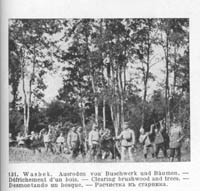 In addition, the WPA Office in Berlin and the YMCA field secretaries continued their efforts to provide as wide a
range of services as possible for prisoners assigned to labor detachments. They visited prisoners working in factories
or fields to offer the personal contact which was the hallmark of Association work.
In addition, the WPA Office in Berlin and the YMCA field secretaries continued their efforts to provide as wide a
range of services as possible for prisoners assigned to labor detachments. They visited prisoners working in factories
or fields to offer the personal contact which was the hallmark of Association work.
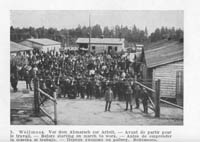 From the main office in Berlin, the YMCA staff shipped out books, musical instruments, athletic equipment, writing
materials, gramophone records, and games. While this work was very difficult for secretaries, it was also among the
most rewarding of services.14
From the main office in Berlin, the YMCA staff shipped out books, musical instruments, athletic equipment, writing
materials, gramophone records, and games. While this work was very difficult for secretaries, it was also among the
most rewarding of services.14
The Resumption of German Government Threats Against WPA Operations
In January 1918, the Germans significantly intensified their enforcement of regulations regarding the activities of enemy aliens. For violations, authorities arrested belligerent nationals and sent them to forced labor. In light of these developments, Hoffman deposited his passport with the Spanish embassy for safekeeping. He soon faced a greater threat to the continuation of WPA services. In February, the Prisoner of War Department of the Ministry of War renewed its criticisms of the Association's POW relief program. The Germans demanded that the YMCA cease operations in Germany, and that Hoffman leave the country within four weeks. The Germans also protested against the continuation of Association work for German POWs in Britain and France. They accused neutral secretaries of implementing a program of "Americanization" propaganda among the Central Power prisoners. Hoffman denied these claims and immediately cabled the Association headquarters in Switzerland for assistance. Large numbers of letters were written from France and Britain on behalf of German POWs, petitioning the German government to permit Association WPA work. German prisoners wrote many of these letters, dispelling the rumors that neutral secretaries conducted propaganda work and praising their efforts. The German Ministry of War eventually determined that the forced withdrawal of the YMCA would hurt their cause in the eyes of the world, and the Germans could ill afford to lose any more moral prestige. Given this international pressure, and the influence of cooler heads within the ministry, the Germans delayed Hoffman's deportation and allowed the YMCA to continue WPA services.15
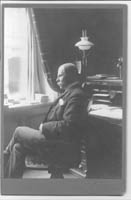 In May 1918, political events again placed WPA operations in Germany in jeopardy. The Ministry of War reconsidered
closing down the WPA Office in Berlin, despite the resumption of WPA operations and the growing need for POW social
services. Gerhard Niedermeyer contacted Karl Fries in Sweden about the crisis, and General Friedrich consulted Prince
Max of Baden on the ministry's decision. On May 18, Friedrich informed Hoffman that the government planned to close
down the Berlin office and personally thanked the American secretary for his assistance to Allied war prisoners.
Niedermeyer would take over the direction of WPA work in Germany. On June 3, Hoffman received an official notice to
close operations; similar steps were being taken to reorganize WPA operations in Saxony.16
In May 1918, political events again placed WPA operations in Germany in jeopardy. The Ministry of War reconsidered
closing down the WPA Office in Berlin, despite the resumption of WPA operations and the growing need for POW social
services. Gerhard Niedermeyer contacted Karl Fries in Sweden about the crisis, and General Friedrich consulted Prince
Max of Baden on the ministry's decision. On May 18, Friedrich informed Hoffman that the government planned to close
down the Berlin office and personally thanked the American secretary for his assistance to Allied war prisoners.
Niedermeyer would take over the direction of WPA work in Germany. On June 3, Hoffman received an official notice to
close operations; similar steps were being taken to reorganize WPA operations in Saxony.16
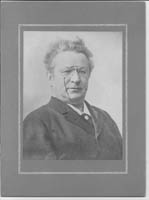 The World's Alliance immediately sprang into action. The World's Committee sent Christian Phildius and Reverend
Adolf Hoffmann to Berlin in June to negotiate with the German government. They wrote a lengthy memorandum to the
Prussian Minister of War outlining the YMCA's overall organization, differentiating the World's Alliance of YMCAs
and the World's Committee in Geneva from the International Committee of the American YMCA in New York. The secretaries
reviewed the activities and goals of the World's Alliance since the beginning of the war and the important successes
in POW social welfare since the establishment of the Kriegsgefangenenhilfe der Weltallianz Christlicher Vereine
jünger Männer. Archibald Harte was in the process of opening a larger office in Bern to facilitate WPA
assistance to Allied POWs in Germany, which would guarantee, through the process of reciprocity, continued services
for German prisoners trapped in Siberia by the breakdown of Russia's economic infrastructure. Hoffmann and Phildius
again emphasized that John R. Mott's participation in the Root Commission did not reflect Association policy and that
the American General Secretary had acted independently of his role in the YMCA.
The World's Alliance immediately sprang into action. The World's Committee sent Christian Phildius and Reverend
Adolf Hoffmann to Berlin in June to negotiate with the German government. They wrote a lengthy memorandum to the
Prussian Minister of War outlining the YMCA's overall organization, differentiating the World's Alliance of YMCAs
and the World's Committee in Geneva from the International Committee of the American YMCA in New York. The secretaries
reviewed the activities and goals of the World's Alliance since the beginning of the war and the important successes
in POW social welfare since the establishment of the Kriegsgefangenenhilfe der Weltallianz Christlicher Vereine
jünger Männer. Archibald Harte was in the process of opening a larger office in Bern to facilitate WPA
assistance to Allied POWs in Germany, which would guarantee, through the process of reciprocity, continued services
for German prisoners trapped in Siberia by the breakdown of Russia's economic infrastructure. Hoffmann and Phildius
again emphasized that John R. Mott's participation in the Root Commission did not reflect Association policy and that
the American General Secretary had acted independently of his role in the YMCA.
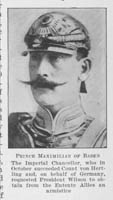 It was essential to convey to the Germans that the World's Committee was not influenced by the International Committee
in New York. The two secretaries pleaded with the Ministry of War not to break off relations between POW
relief efforts in Germany and the World's Alliance, but to leave welfare work in the hands of the WPA. The World's
Alliance secretaries also sought an interview with General Friedrich. Unfortunately, Friedrich was attending a POW
conference with British representatives at The Hague, negotiating a treaty on the exchange of prisoners. Because of the
delegates' success with members of the Ministry of War, Niedermeyer offered to carry the World's Alliance's position to
the conference, and left two days after the meeting. During the delay, Phildius and Hoffmann visited Prince Max in
Baden-Baden and discussed the situation with him. Convinced of the justice of the Association's cause, Prince Max cabled
Friedrich at The Hague, declaring his support for the World's Alliance's plan to continue WPA operations using neutral
secretaries. Given the state of the German war effort, the limited resources of the German National YMCA, the WPA's expertise,
and concerns for German POWs in Russia, the Ministry of War relented once again. There were deep divisions with the Prisoner
of War Committee of the Prussian Ministry of War between officers who opposed the presence of neutral welfare workers on
German soil and pragmatists who recognized the value of an effective WPA program. Conrad Hoffman was once again permitted
to remain, and continued to work out of the WPA Office in Berlin. The political controversy between the American and German
National YMCA Committees that threatened to cripple the World's Alliance shifted from Berlin to Geneva.17
It was essential to convey to the Germans that the World's Committee was not influenced by the International Committee
in New York. The two secretaries pleaded with the Ministry of War not to break off relations between POW
relief efforts in Germany and the World's Alliance, but to leave welfare work in the hands of the WPA. The World's
Alliance secretaries also sought an interview with General Friedrich. Unfortunately, Friedrich was attending a POW
conference with British representatives at The Hague, negotiating a treaty on the exchange of prisoners. Because of the
delegates' success with members of the Ministry of War, Niedermeyer offered to carry the World's Alliance's position to
the conference, and left two days after the meeting. During the delay, Phildius and Hoffmann visited Prince Max in
Baden-Baden and discussed the situation with him. Convinced of the justice of the Association's cause, Prince Max cabled
Friedrich at The Hague, declaring his support for the World's Alliance's plan to continue WPA operations using neutral
secretaries. Given the state of the German war effort, the limited resources of the German National YMCA, the WPA's expertise,
and concerns for German POWs in Russia, the Ministry of War relented once again. There were deep divisions with the Prisoner
of War Committee of the Prussian Ministry of War between officers who opposed the presence of neutral welfare workers on
German soil and pragmatists who recognized the value of an effective WPA program. Conrad Hoffman was once again permitted
to remain, and continued to work out of the WPA Office in Berlin. The political controversy between the American and German
National YMCA Committees that threatened to cripple the World's Alliance shifted from Berlin to Geneva.17
Neutral Secretaries Assume Operations in Austria-Hungary
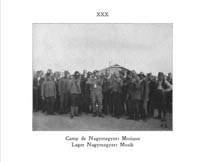 The transition between American secretaries and other neutral secretaries was far smoother in Austria-Hungary than in Germany. Neutral European secretaries had worked in some camps since the introduction of YMCA services in the Dual Monarchy.
The transition between American secretaries and other neutral secretaries was far smoother in Austria-Hungary than in Germany. Neutral European secretaries had worked in some camps since the introduction of YMCA services in the Dual Monarchy. 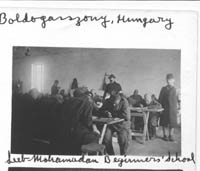 For example, the Swiss secretary Jean Schoop directed the Association POW programs in Boldogasszony and Sopronnyek, while
Heinrich A. Münger, another Swiss secretary, ran the Red Triangle programs in Dunaszerdahely and Nagymegyer in Hungary
from June 1916 until the end of the war.
For example, the Swiss secretary Jean Schoop directed the Association POW programs in Boldogasszony and Sopronnyek, while
Heinrich A. Münger, another Swiss secretary, ran the Red Triangle programs in Dunaszerdahely and Nagymegyer in Hungary
from June 1916 until the end of the war.
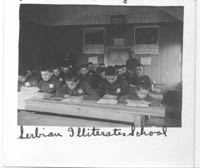 At Grödig in Salzburg, in Braunau-am-Inn in Lower Austria, and in Aschbach and Marchtrenk in Upper Austria, Lars
Stubbe Teglbjärg initiated YMCA operations in November 1916 and remained until August 1917. In March 1917, Max Rieser,
a Swiss secretary, took over operations at Deutsch-Gabel and took over operations two months later at Theresienstadt and
Reichenberg in Bohemia. Karl Stettler, another Swiss secretary, began WPA services in Kleinmünchen in Upper Austria
in April 1917 and at Mauthausen in August 1917, maintaining relief work until March 1918.18
At Grödig in Salzburg, in Braunau-am-Inn in Lower Austria, and in Aschbach and Marchtrenk in Upper Austria, Lars
Stubbe Teglbjärg initiated YMCA operations in November 1916 and remained until August 1917. In March 1917, Max Rieser,
a Swiss secretary, took over operations at Deutsch-Gabel and took over operations two months later at Theresienstadt and
Reichenberg in Bohemia. Karl Stettler, another Swiss secretary, began WPA services in Kleinmünchen in Upper Austria
in April 1917 and at Mauthausen in August 1917, maintaining relief work until March 1918.18
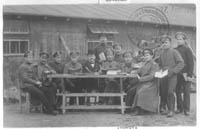 Slowly but surely, new neutral secretaries entered the field in the Dual Monarchy to replace the American WPA workers who
left the empire in April 1917. Lars E. Högberg was the first neutral worker to arrive in Austria-Hungary after the
American withdrawal.
Slowly but surely, new neutral secretaries entered the field in the Dual Monarchy to replace the American WPA workers who
left the empire in April 1917. Lars E. Högberg was the first neutral worker to arrive in Austria-Hungary after the
American withdrawal.
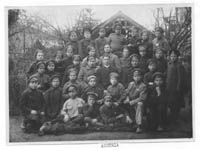 He resumed the POW Association programs in Bohemia at Milowitz in June 1917 and at Brüx the next month. The
Swedish secretary remained at these camps until September 1918. The most active month for renewing Association POW
operations was August 1917, when eight camps received five new Red Triangle representatives. John Klanmann, a Swedish
secretary, revived the YMCA POW programs at Purgstall and Wieselberg in Lower Austria and at Hart in Upper Austria.
Another new Swedish secretary, Thorsten Wallenius, took over operations in Bohemia.
He resumed the POW Association programs in Bohemia at Milowitz in June 1917 and at Brüx the next month. The
Swedish secretary remained at these camps until September 1918. The most active month for renewing Association POW
operations was August 1917, when eight camps received five new Red Triangle representatives. John Klanmann, a Swedish
secretary, revived the YMCA POW programs at Purgstall and Wieselberg in Lower Austria and at Hart in Upper Austria.
Another new Swedish secretary, Thorsten Wallenius, took over operations in Bohemia.
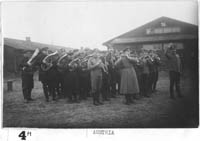 He restored POW relief work at Braunau-in-Böhmen and expanded operations to Josefstadt in January 1918. The new
Danish secretary, Axel Busch, reestablished the POW program at Somorja and Zalägerszeg in Hungary. J. J. Hertig,
another new Danish secretary, resumed the "Y" program at Spratzern in Lower Austria. Hertig expanded his area of operation
to include Siegmundsherberg in December, Neulengbach in February 1918 (both camps in Lower Austria), and Braunau-am-Inn
in Upper Austria in March. Hermann Morgenthaler, a Swiss secretary, renewed the WPA program at Eger and Heinrichsgrün
in Bohemia, and remained in the field until January 1918.
He restored POW relief work at Braunau-in-Böhmen and expanded operations to Josefstadt in January 1918. The new
Danish secretary, Axel Busch, reestablished the POW program at Somorja and Zalägerszeg in Hungary. J. J. Hertig,
another new Danish secretary, resumed the "Y" program at Spratzern in Lower Austria. Hertig expanded his area of operation
to include Siegmundsherberg in December, Neulengbach in February 1918 (both camps in Lower Austria), and Braunau-am-Inn
in Upper Austria in March. Hermann Morgenthaler, a Swiss secretary, renewed the WPA program at Eger and Heinrichsgrün
in Bohemia, and remained in the field until January 1918.
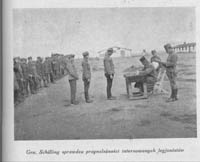 Of note, Morgenthaler established a POW relief program at Plan in Bohemia in December 1917; this was the only
camp that the American YMCA did not initiate operations in Austria-Hungary. POW operations in Austria-Hungary,
especially for Russian and Romanian prisoners, were cut back with the signing of the Treaty of Brest-Litovsk
in March 1918. The number of Eastern European prisoners declined dramatically with the peace and the conclusion of
major offensive operations in the East. The Austro-Hungarian government began to send POWs back to Russia, the Ukraine,
and Finland in large numbers in May 1918, but POW relief work for Italian prisoners remained a high priority for the
Association.19
Of note, Morgenthaler established a POW relief program at Plan in Bohemia in December 1917; this was the only
camp that the American YMCA did not initiate operations in Austria-Hungary. POW operations in Austria-Hungary,
especially for Russian and Romanian prisoners, were cut back with the signing of the Treaty of Brest-Litovsk
in March 1918. The number of Eastern European prisoners declined dramatically with the peace and the conclusion of
major offensive operations in the East. The Austro-Hungarian government began to send POWs back to Russia, the Ukraine,
and Finland in large numbers in May 1918, but POW relief work for Italian prisoners remained a high priority for the
Association.19
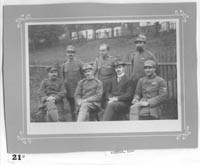 New neutral secretaries arrived in the fall and winter of 1917-1918 to expand the World Alliance WPA service.
Jacob Wettstein, a Swiss secretary, began operations at Grödig in Salzburg in October and expanded services
to Aschbach, Braunau-am-Inn, and Marchtrenk in Upper Austria two months later. Another Swiss secretary, Heinrich
Thommen, arrived in Austria-Hungary in January 1918 to replace Morgenthaler. Thommen took over POW relief work in
Bohemia in March, serving prisoners in Eger, Heinrichsgrün, and Plan. The WPA secretary later extended his
area of operations to Brüx in November 1918. It is interesting to note that Thommen continued operations at
Heinrichsgrün until February 1919, serving in the new republic of Czechoslovakia. The next major influx of
neutral secretaries followed in July 1918 with the arrival of three Swiss secretaries, which led to a reassignment
of prison camp assignments. Julius Emil von Aesch took over WPA services at Mauthausen in Upper Austria from Stettler
and assumed responsibility for Red Triangle programs at Deutsch-Gabel, Reichenberg, and Theresienstadt in Bohemia from
Rieser. Edouard Hug began to supervise WPA activities at Aschbach, Braunau-am-Inn, and Marchtrenk in Upper Austria
and at Grödig in Salzburg replacing Wettstein.
New neutral secretaries arrived in the fall and winter of 1917-1918 to expand the World Alliance WPA service.
Jacob Wettstein, a Swiss secretary, began operations at Grödig in Salzburg in October and expanded services
to Aschbach, Braunau-am-Inn, and Marchtrenk in Upper Austria two months later. Another Swiss secretary, Heinrich
Thommen, arrived in Austria-Hungary in January 1918 to replace Morgenthaler. Thommen took over POW relief work in
Bohemia in March, serving prisoners in Eger, Heinrichsgrün, and Plan. The WPA secretary later extended his
area of operations to Brüx in November 1918. It is interesting to note that Thommen continued operations at
Heinrichsgrün until February 1919, serving in the new republic of Czechoslovakia. The next major influx of
neutral secretaries followed in July 1918 with the arrival of three Swiss secretaries, which led to a reassignment
of prison camp assignments. Julius Emil von Aesch took over WPA services at Mauthausen in Upper Austria from Stettler
and assumed responsibility for Red Triangle programs at Deutsch-Gabel, Reichenberg, and Theresienstadt in Bohemia from
Rieser. Edouard Hug began to supervise WPA activities at Aschbach, Braunau-am-Inn, and Marchtrenk in Upper Austria
and at Grödig in Salzburg replacing Wettstein.
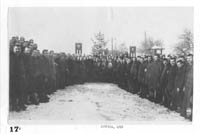 Hug later took over YMCA operations in Bohemia in Deutsch-Gabel, Reichenberg, and Theresienstadt during the repatriation
process. Heinrich Waldvogel supervised Red Triangle programs at Hart in Upper Austria and at Purgstall and Wieselburg
in Lower Austria, taking over Klanmann's duties. The last neutral secretary to take up a field assignment in the Dual
Monarchy was H. Shoemaker, a Swedish secretary. He supervised the end of WPA services at Millowitz in Bohemia in
November 1918 as Allied prisoners headed home. Of the major prison camps that the American YMCA had entered before
April 1917, only two-Kenyermezö and Ostfiasszoyfa in Hungary-did not continue to receive World's Alliance
secretaries on a regular basis. Of note, three new Swiss WPA secretaries, Ferdinand Barth, Carl Hahn, and Paul Vetterli,
arrived in Austria-Hungary in September 1918 to begin relief operations. Unfortunately, the imminent collapse of the
empire prevented these men from receiving their field assignments before the end of the war.20
Hug later took over YMCA operations in Bohemia in Deutsch-Gabel, Reichenberg, and Theresienstadt during the repatriation
process. Heinrich Waldvogel supervised Red Triangle programs at Hart in Upper Austria and at Purgstall and Wieselburg
in Lower Austria, taking over Klanmann's duties. The last neutral secretary to take up a field assignment in the Dual
Monarchy was H. Shoemaker, a Swedish secretary. He supervised the end of WPA services at Millowitz in Bohemia in
November 1918 as Allied prisoners headed home. Of the major prison camps that the American YMCA had entered before
April 1917, only two-Kenyermezö and Ostfiasszoyfa in Hungary-did not continue to receive World's Alliance
secretaries on a regular basis. Of note, three new Swiss WPA secretaries, Ferdinand Barth, Carl Hahn, and Paul Vetterli,
arrived in Austria-Hungary in September 1918 to begin relief operations. Unfortunately, the imminent collapse of the
empire prevented these men from receiving their field assignments before the end of the war.20
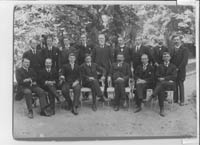 MacNaughten, unlike his American counterpart in Germany, chose not to remain behind enemy lines for the duration of
the war. MacNaughten left Austria-Hungary in October 1917, shortly before the United States declared war on
Austria-Hungary; Clarence Bartz and William Lauterbach had departed before the Senior Secretary. The imperial government
in Vienna urged MacNaughten to remain to supervise the POW relief work, but he decided to transfer to Russia. Max
Wilhelmi, a Swiss secretary, arrived in Vienna in November 1917 and assumed the role of Senior Secretary. He was
assisted in the Central Office by Teglbjärg and Harald Knutzen, a Norwegian secretary who arrived in Vienna in
January 1918. By that time, the International Committee in New York reported that all of the American secretaries
in Austria-Hungary had been replaced, and that POW work had resumed its February 1917 level. Wilhelmi coordinated
Association work from Vienna, and met with the field secretaries in Linz in July 1918 to maintain efficient operations.
By September 1918, a total of sixteen World's Alliance secretaries were at work in Austria-Hungary conducting POW
operations. Of this total, ten were Swiss, three were Swedish, two were Danish, and one was Norwegian. Although American
personnel had withdrawn from the Dual Monarchy, the International Committee continued to fund POW relief
operations.21
MacNaughten, unlike his American counterpart in Germany, chose not to remain behind enemy lines for the duration of
the war. MacNaughten left Austria-Hungary in October 1917, shortly before the United States declared war on
Austria-Hungary; Clarence Bartz and William Lauterbach had departed before the Senior Secretary. The imperial government
in Vienna urged MacNaughten to remain to supervise the POW relief work, but he decided to transfer to Russia. Max
Wilhelmi, a Swiss secretary, arrived in Vienna in November 1917 and assumed the role of Senior Secretary. He was
assisted in the Central Office by Teglbjärg and Harald Knutzen, a Norwegian secretary who arrived in Vienna in
January 1918. By that time, the International Committee in New York reported that all of the American secretaries
in Austria-Hungary had been replaced, and that POW work had resumed its February 1917 level. Wilhelmi coordinated
Association work from Vienna, and met with the field secretaries in Linz in July 1918 to maintain efficient operations.
By September 1918, a total of sixteen World's Alliance secretaries were at work in Austria-Hungary conducting POW
operations. Of this total, ten were Swiss, three were Swedish, two were Danish, and one was Norwegian. Although American
personnel had withdrawn from the Dual Monarchy, the International Committee continued to fund POW relief
operations.21
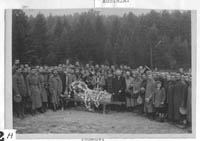 The sudden withdrawal of American secretaries from Central Europe in 1917 was devastating to WPA operations for Allied
prisoners. Although Hoffman strove to maintain services in Germany, the slow arrival of neutral secretaries hindered
relief work. It took several months for enough neutral Red Triangle workers to transfer to Germany and Austria-Hungary,
and the relief work these new secretaries delivered never exceeded the volume of service provided by the Americans by
February 1917. Despite these problems, the American YMCA's Principle of Visitation mitigated some of these difficulties,
since the field secretaries organized the POWs on the model of self-help committees.
The sudden withdrawal of American secretaries from Central Europe in 1917 was devastating to WPA operations for Allied
prisoners. Although Hoffman strove to maintain services in Germany, the slow arrival of neutral secretaries hindered
relief work. It took several months for enough neutral Red Triangle workers to transfer to Germany and Austria-Hungary,
and the relief work these new secretaries delivered never exceeded the volume of service provided by the Americans by
February 1917. Despite these problems, the American YMCA's Principle of Visitation mitigated some of these difficulties,
since the field secretaries organized the POWs on the model of self-help committees.
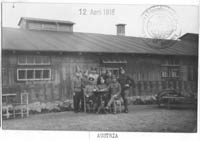 Hoffman was able to keep camp relief organizations supplied, and the relief work continued. Hoffman also assumed a
special responsibility during his solo tenure in Germany after the American withdrawal. With the arrival of American
troops on the Western Front, he took special interest in the U.S. prisoners who began to appear in German prison camps
in large numbers in February 1918. The American YMCA strove to provide services to American prisoners, especially since
funding for the organization relied heavily on voluntary subscriptions gained through war drive campaigns. We shall turn
to the services provided for American POWs in the next chapter.
Hoffman was able to keep camp relief organizations supplied, and the relief work continued. Hoffman also assumed a
special responsibility during his solo tenure in Germany after the American withdrawal. With the arrival of American
troops on the Western Front, he took special interest in the U.S. prisoners who began to appear in German prison camps
in large numbers in February 1918. The American YMCA strove to provide services to American prisoners, especially since
funding for the organization relied heavily on voluntary subscriptions gained through war drive campaigns. We shall turn
to the services provided for American POWs in the next chapter.
Notes:
Note 1: The National YMCA Councils of Denmark, Norway, Sweden, and Switzerland answered the World Committee's call by recruiting and despatching secretaries for WPA work in Germany and Austria-Hungary. The Dutch YMCA did not send any personnel for POW relief work in the Central Power states because they were needed for welfare services for interned prisoner of war, refugee, and soldier relief aid in their kingdom. Archibald C. Harte, "Germany: For Prisoners of War: Allied Prisoners in Germany," For the Millions of Men Now Under Arms 2 (1 November 1917): 45; Conrad Hoffman, "Prisoners," For the Millions of Men Now Under Arms 2 (10 June 1918): 47; Conrad Hoffman, Jr., In the Prison Camps of Germany: A Narrative of "Y" Service among Prisoners of War (New York: Association Press, 1920), 103-4; International Committee of Young Men's Christian Associations, "Summary of Minutes of Regular Monthly Meetings of the International Committee of the Young Men's Christian Associations," 11 January 1918, New York. International Committee, Monthly Meeting Minutes, 1917-1924. Kautz Family YMCA Archives, University of Minnesota Libraries, Minneapolis, MN; Christian Phildius, "Rapport de M. Phildius sur son dernier voyage en Allemagne et en Scandinavie," 15 September 1917, Geneva, 1-6. World's Alliance Box X391: "War Work Y.M.C.A., 1914-1918: World's Committee, Geneva." Folder: "War Work of World's Committee-Reports of Christian Phildius." World's Alliance of YMCAs Archives, Geneva; and Olin D. Wannamaker, For the Six Million Prisoners: The Welfare Work of the YMCA in the Prison Camps of Ten Nations during World War I (September 1921), 185-86. back
Note 2: Haldan Högsbro, "Report for the Month of November 1917 of Haldan Högsbro," December 1917, 1-4; Marius Hansen, "Report for the Month of December 1917 of Marius Hansen," December 1917, 1; H. O. Juhl, "Report for the Month of November 1917 of H. O. Juhl," November 1917, 1; H. O. Juhl, "Report for the Month of December 1917 of H. O. Juhl," December 1917, 1-2. World's Alliance Box X391.2: "War Prisoners' Aid YMCA, 1914-1915; POW Camps in Germany and France; War Guilt Question." Section 43: "Germany." Folder: "Reports from POW Camps in Germany, 1917." World's Alliance of YMCAs Archives, Geneva; Haldan Högsbro, "Report for the Month of December by Secretary Högsbro, Dresden, Germany," December 1917, Dresden, 1-5. Haldan Högsbro, "Report of the Month of January 1918," January 1918, Dresden, 1-5. Haldan Högsbro, "Camps de Prisonniers Francais en Allemagne: Rapport de M. Högsbro a Dresden, Fevrier 1918," February 1918, Dresden, 1-3. Marius Hansen, "Rapport pour le Mois de Fevrier 1918 de M. Marius HANSEN, Sekretaire neutre des camps de Prisonniers de Guerre, Prasse Orientale," February 1918, East Prussia, 1-2. Marius Hansen, "Camps de Prisonniers Britanniques, Francais et Russes en Allemagne: Rapport de M. Marius HANSEN pour Mars 1918," March 1918, 1-3. World's Alliance Box X391.2: "War Prisoners' Aid YMCA, 1914-1915; POW Camps in Germany and France; War Guilt Question." Section 43: "Germany." Folder: "Reports from POW Camps in Germany, 1918." World's Alliance of YMCAs Archives, Geneva; Hans A. Högsbro, "War Prisoners' Camps in Germany: Report for September," October 1918, Frankfurt-am-Main, 1-2. Hans A. Högsbro, "War Prisoners' Camps-Germany: Report by Mr. Hoegsberg," August 1918, Frankfurt-am-Main, 1-2. Marius Hansen, "Monthly Report, January 1918," January 1918, 1-2. Marius Hansen, "Report of the Month of September 1918," October 1918, 1-3. Marius Hansen, "War Prisoners' Camps Germany: Report of the Month of August 1918, Mr. Hansen," September 1, 1918, 1-4. World's Alliance Box X391.2: "War Prisoners' Aid YMCA, 1914-1915; POW Camps in Germany and France; War Guilt Question." Section 43: "Germany." Folder: "Reports from POW Camps in Germany, 1917-1918." World's Alliance of YMCAs Archives, Geneva; "War Prisoners' Aid, Young Men's Christian Associations," 26 March 1918, 3. "War Prisoners' Aid, Young Men's Christian Associations Summary," 5 September 1918, 4. World's Alliance Box X391: "War Work Y.M.C.A., 1914-1918: World's Committee, Geneva." Folder: "War Prisoners' Aid Y.M.C.A.-Lists of Secretaries/ Instructions for Secretaries, 1914-1918." World's Alliance of YMCAs Archives, Geneva; and Hoffman, In the Prison Camps of Germany, 279. back
Note 3: Emmanuel Diehl, "Bericht über die Arbeit in den XIII, XIV, und XVIII Armeekorps, November 1917," 2 December 1917, Breslau, 1-3; Emmanuel Diehl, "Bericht über Arbeit in XIII, XIV, und XVIII Armeekorps, Dezember 1917," 1-6; J. Brenning, "Secretaire Brenning Veme et VIeme Corps d'Armee. Report Mensuel pour Novembre 1917," 2 December 1917, Breslau, 1. World's Alliance Box X391.2: "War Prisoners' Aid YMCA, 1914-1915; POW Camps in Germany and France; War Guilt Question." Section 43: "Germany." Folder: "Reports from POW Camps in Germany, 1917." World's Alliance of YMCAs Archives, Geneva; Emmanuel Diehl, "Camps de Prisonniers d'Allemagne: Rapport de Mr. Em. Diehl sur la travail dans les 13e., 14e., et 18e Corps d'Armee pour Janvier 1918," February 1918, 1-2. World's Alliance Box X391.2: "War Prisoners' Aid YMCA, 1914-1915; POW Camps in Germany and France; War Guilt Question." Section 43: "Germany." Folder: "Reports from POW Camps in Germany, 1918." World's Alliance of YMCAs Archives, Geneva; "War Prisoners' Aid, Young Men's Christian Associations," 26 March 1918, 3. "War Prisoners' Aid, Young Men's Christian Associations Summary," 5 September 1918, 4. World's Alliance Box X391: "War Work Y.M.C.A., 1914-1918: World's Committee, Geneva." Folder: "War Prisoners' Aid Y.M.C.A.-Lists of Secretaries/ Instructions for Secretaries, 1914-1918." World's Alliance of YMCAs Archives, Geneva; and Hoffman, In the Prison Camps of Germany, 275 and 279. back
Note 4: Eduard Schaetti, "Rapport de mon activite du 1er Juillet au 15 Novembre 1917," November 1917, 1-7; Eduard Schaetti, "Fete de Noel aux Ateliers de Lazerets d'Erfurt," 3 January 1918, 1-2. World's Alliance Box X391.2: "War Prisoners' Aid YMCA, 1914-1915; POW Camps in Germany and France; War Guilt Question." Section 43: "Germany." Folder: "Reports from POW Camps in Germany, 1917." World's Alliance of YMCAs Archives, Geneva. Eduard Schaetti, "Reisebericht von Sekretär Ed Schaetti, Februar und März 1918," 6 April 1918, Charlottenburg, 1-3; Eduard Schaetti, "Rapport sur ma Premier Visite dans 10 Detachments de Travail du Camp de Wittenberg," 5 March 1918, 1-2; Paul Arni to Conrad Hoffman, "Rapport Mensuel des Camps de Prisonniers de Guerre de Royaume de Baviere," no date, Munich, 1-3; Paul Arni to Conrad Hoffman, "Report of Mr. Paul Arni, Secretary for Bavaria for the Month of March 1918," 4 April 1918, Munich, 1-4; Paul Arni to Conrad Hoffman, "Camps du Prisonniers Francais en Allemagne: Rapport de M. Paul Arni," 5 March 1918, Würzburg, 1-6; Paul Arni to Christian Phildius, "Bericht des Herrn Arni," 30 April 1918, Nürnberg, 1-9; Paul Arni, "Camps de Prisonniers Francais en Allemagne: Rapport de M. Paul Arni (Secretaire Suisse), Mai 1918," June 1918, 1-2. World's Alliance Box X391.2: "War Prisoners' Aid YMCA, 1914-1915; POW Camps in Germany and France; War Guilt Question." Section 43: "Germany." Folder: "Reports from POW Camps in Germany, 1918." World's Alliance of YMCAs Archives, Geneva. Paul Arni to Conrad Hoffman, "Monatsbericht aus den Kriegsgefangenenlagern im Königreich Bayern," no date, 1-4; Paul Arni, "Camps of French and British Prisoners of War in Germany: Report of Mr. Paul Arni, Swiss Secretary, April 1918," May 1918, 1-6; Paul Arni to Conrad Hoffman, 30 April 1918, Nürnberg, 1-9; Paul Arni, "Camps de prisonniers de guerre en Allemagne: Rapport de M. Arni pour Aout 1918," September 1918, 1-2; Paul Arni to Conrad Hoffman, 4 September 1918, Ulm, 1-2; Paul Arni to Conrad Hoffman, 4 October 1918, Munich, 1-2. Paul Arni to Conrad Hoffman, 1 November 1918, Augsburg, 1-2. World's Alliance Box X391.2: "War Prisoners' Aid YMCA, 1914-1915; POW Camps in Germany and France; War Guilt Question." Section 43: "Germany." Folder: "Reports from POW Camps in Germany, 1917-1918." World's Alliance of YMCAs Archives, Geneva. "War Prisoners' Aid, Young Men's Christian Associations," 26 March 1918, 3; "War Prisoners' Aid, Young Men's Christian Associations Summary," 5 September 1918, 4. World's Alliance Box X391: "War Work Y.M.C.A., 1914-1918: World's Committee, Geneva." Folder: "War Prisoners' Aid Y.M.C.A.-Lists of Secretaries/ Instructions for Secretaries, 1914-1918." World's Alliance of YMCAs Archives, Geneva. Christian Phildius to Paul Des Gouttes, 3 June 1918, Romanshorn, Switzerland, 1-2. World's Alliance Box X391.2: "War Prisoners' Aid YMCA, 1914-1915; POW Camps in Germany and France; War Guilt Question." Section 43: "Germany." Folder: "War Prisoners' Aid in Germany: Miscellaneous." World's Alliance of YMCAs Archives, Geneva; and Hoffman, In the Prison Camps of Germany, 269 and 279. back
Note 5: The YMCA did extend visits to Heilsburg in eastern Prussia, under the I Army Corps, but there were few prison camps in this part of Germany due to its proximity to the Eastern Front. Thorlief Boman, "Monatsbericht für März 1918," 4 April 1918, Kassel, 1-4; Thorlief Boman, "Camp de Prisonniers de Guerre d'Allemagne: Rapport de M. Tholief Boman pour Avril 1918," 4 April 1918, Kassel, 1-3; "War Prisoners' Aid, Young Men's Christian Associations," 26 March 1918, 3; "War Prisoners' Aid, Young Men's Christian Associations Summary," 5 September 1918, 4. World's Alliance Box X391: "War Work Y.M.C.A., 1914-1918: World's Committee, Geneva." Folder: "War Prisoners' Aid Y.M.C.A.-Lists of Secretaries/ Instructions for Secretaries, 1914-1918." World's Alliance of YMCAs Archives, Geneva; and Hoffman, In the Prison Camps of Germany, 279. back
Note 6: Hoffman, In the Prison Camps of Germany, 103-4. back
Note 7: Hoffman, In the Prison Camps of Germany, 118; Conrad Hoffman, "Prisoners," 47-48; Wannamaker, Six Million, 30; and Carl P. Dennett, The Prisoners of the Great War: Authoritative Statement of Conditions In the Prison Camps of Germany (Boston: Houghton Mifflin, 1919), 222. back
Note 8: The Wilson Administration shifted into high gear for total war after declaring war against Germany in April 1917 by establishing official boards to oversee war loans, food production, trade, etc. President Wilson appointed the War Trade Board on 14 October 1917, under the authority of the Trading with the Enemy Act, to supervise exports and imports, licenses to trade with enemy firms, and overall foreign trade. The War Trade Board included representatives of the Secretaries of State, Treasury, Agriculture, and Commerce, plus the Food Administration and the Shipping Board. Frederic L. Paxson, Edward S. Corwin, and Samuel B. Harding, eds., War Cyclopedia: A Handbook for Ready Reference on the Great War (Washington, D.C.: Government Printing Office, 1918), 300; Uncle Sam's Fact Book of the World War Containing A Thousand and One Facts Worth Knowing Concerning the Struggle for Democracy Including Army and Navy Organization, Insignia of Rank, Pay Rolls, Branches of the Service, Regulating Laws, Classification under and Official Record of Drafts, Etc. (New York: C. S. Hammond and Company, Inc., 1918), 128; and Wannamaker, Six Million, 188. back
Note 9: Wannamaker, Six Million, 189. back
Note 10: Ibid., 190-91. back
Note 11: Ibid., 191-92. back
Note 12: Hoffman, In the Prison Camps of Germany, 126-27 and 131-32; and Wannamaker, Six Million, 192-93. back
Note 13: Hoffman, In the Prison Camps of Germany, 128; and Wannamaker, Six Million, 193-95. back
Note 14: Hoffman, In the Prison Camps of Germany, 125-26. back
Note 15: Hoffman, In the Prison Camps of Germany, 145-46 and 160. back
Note 16: Gerhard Niedermeyer, "Abschrift eines Briefes des Dr. Niedermeyer an Herrn Dr. Karl Fries," 18 May 1918, Berlin, 1; General Friedrich, "Abschrift eines Briefes des General Friedrichs an Seine Grossherzogliche Hoheit Prince Max von Baden," 18 May 1918, Berlin, 1; General Friedrichs, "Abschrift einese Briefes des Herrn General Friedrichs an Herrn Conrad Hoffmann," 18 May 1918, 1; General Friedrichs to Conrad Hoffman, 3 June 1918, Berlin, 1; Gerhard Niedermeyer and Pastor Mann, "Niederschrift über eine Besprechung in Sachsen der Kriegsgefangenenhilfe der Weltallianz Christlicher Vereine jünger Männer am Donnerstag, den 6. Juni 1918 zu Berlin, NW," circa June 1918, 1-2. World's Alliance Box X391.2: "War Prisoners' Aid of World's Committee Forbidden in Germany 1918." Section 43: "Germany." Folder: "War Prisoners' Aid in Germany: Miscellaneous." World's Alliance of YMCAs Archives, Geneva. back
Note 17: Adolf Hoffman and Christian Phildius, "Memorandum for the Royal Prussian War Ministry at Berlin," 10 June 1918, Berlin, Germany, 1-4. World's Alliance Box X391.2: "War Prisoners' Aid YMCA, 1914-1915; POW Camps in Germany and France; War Guilt Question." Section 43: "Germany." Folder: "War Prisoners' Aid of World's Committee Forbidden in Germany 1918." World's Alliance of YMCAs Archives, Geneva; Adolf Hoffman and Christian Phildius to the Imperial Prussian War Minister, 10 June 1918, 1-4. World's Alliance Box X391.2: "War Prisoners' Aid YMCA, 1914-1915; POW Camps in Germany and France; War Guilt Question." Section 43: "Germany." Folder: "War Prisoners' Aid in Germany: Miscellaneous." World's Alliance of YMCAs Archives, Geneva; "Memorandum to Mr. Henroid," circa April 1918, 5-6. World's Alliance Box X391: "War Work Y.M.C.A., 1914-1918: World's Committee, Geneva." Folder: "War Prisoners' Aid Y.M.C.A.-Lists of Secretaries/Instructions for Secretaries, 1914-1918." World's Alliance of YMCAs Archives, Geneva; and Christian Phildius to Paul Des Gouttes, 21 March 1918, Geneva, 1-7. Christian Phildius, "Rapport de M. Phildius sur son voyage en Allemagne en compagnie de M. Hoffman du 1-19 Juin 1918," circa June 1918, 1-4. World's Alliance Box X391: "War Work Y.M.C.A., 1914-1918: World's Committee, Geneva." Folder: "War Work of World's Committee-Reports of Christian Phildius." World's Alliance of YMCAs Archives, Geneva. back
Note 18: H. A. Münger, "Review of Our Work in the War Prisoners Camp at Nagymegyer (Servians) and Dunaszerdahely (Russians) after a Twelve Months' Activity, June 19, 1917," 19 June 1917, 1-4; Heinrich A. Münger, "Report for the Months August, September, October 1917. War Prisoners Camps Nagymegyer, Hungary," circa November 1917, 1; Heinrich A. Münger, "Report of Christmas 1917, War Prisoners Camp Dunaszerdahely," 12 January 1918, 1-2; Karl Stettler, "Report for the Months of April-October 1917. War Prisoners Camp Kleinmünchen," circa November 1917, 1-2. Box X391.2: "War Prisoners' Aid, Y.M.C.A., 1914-1918: P.O.W. Camps in Austria-Reports." Folder: "War Prisoners Aid in Austria: Reports from P.O.W. Camps: Millowitz, Spratzern, Siegmundsherberg, Nagymegyer, Dunaszerdahely, Kenyermezö, Kleinmünchen, 1914-1918. World's Alliance of YMCAs Archives, Geneva. Jean Schoop, "Report for June 1917. War Prisoners Camp Sopronnyek, Hungary," circa July 1917, 1; Jean Schoop, "Report for the Months April-May 1918. War Prisoners Camp Sopronnyek," circa July 1918, 1; Jean Schoop, "Bericht &uunl;ber den Monat Juli von Sekretär Jean Schoop. Kriegsgefangenenlager Boldogasszony (Ungarn)," circa August 1917, 1; Jean Schoop, "Report for April 1918. War Prisoners Camp Boldogasszony," circa May 1918, 1. Box X391.2: "War Prisoners' Aid, Y.M.C.A., 1914-1918: P.O.W. Camps in Austria-Reports." Folder: "War Prisoners Aid in Austria: Reports from P.O.W. Camps: Sopronnyek, Boldogasszony, Zalägerszeg, Ostyffiazonyfa, Somorja, 1914-1918," World's Alliance of YMCAs Archives, Geneva. Jean Schoop, "Bericht über die Auflösung des Kriegsgefangenenlager zu Sopronnyek von Sekretär Jean Schoop," 10 November 1918, Vienna, 1-2. Box X391.2: "War Prisoners' Aid, Y.M.C.A., 1914-1918: P.O.W. Camps in Austria-Reports." Folder: "War Prisoners Aid in Austria, 1914-1918." World's Alliance of YMCAs Archives, Geneva. Karl Stettler, "August Bericht-1917. Kriegsgefangenenlager Mauthausen, Oberösterreich," 3 September 1917, Mauthausen, 1-3. Box X391.2: "War Prisoners' Aid, Y.M.C.A., 1914-1918: P.O.W. Camps in Austria-Reports." Folder: "War Prisoners Aid in Austria: Reports from P.O.W. Camps: Josefstadt, Eger, Heinrichsgrün, Mauthausen, 1914-1918." World's Alliance of YMCAs Archives, Geneva. Max Rieser-Knoll, "Bericht für die Monate Mai-Juli 1917 der Kriegsgefangenenhilfe Christlicher Vereine jünger Männer im Russischen Kriegsgefangenenlager zu Reichenberg (Böhmen)," August 1917, Reichenberg, 1-8; Max Rieser, "Report for the Months of May to October 1917. War Prisoners Camp Deutsch-Gabel," October 1917, Deutsch-Gabel, Austria, 1-2; Max Rieser, "Report for the Months of May-October 1917. War Prisoners Camp Theresienstadt," circa November 1917, 1-2. Box X391.2: "War Prisoners' Aid, Y.M.C.A., 1914-1918: P.O.W. Camps in Austria-Reports." Folder: "War Prisoners Aid in Austria: Reports from P.O.W. Camps: Reichenberg, Deutsch-Gabel, Theresienstadt, 1914-1918." World's Alliance of YMCAs Archives, Geneva. Lars Stubbe Teglbjärg, "Report: June 15th to August 16th, 1917. War Prisoners Camp Grödig near Salzburg." August 1917, Grödig, Austria, 1-3. Box X391.2: "War Prisoners' Aid, Y.M.C.A., 1914-1918: P.O.W. Camps in Austria-Reports." Folder: "War Prisoners Aid in Austria: Reports from P.O.W. Camps: Aschbach, Grödig, Braunau, 1914-1918." World's Alliance of YMCA's Archives, Geneva. Jean Schoop, "Report April-May 1918, Sopronnyek," circa May 1918, Sopronnyek, Hungary, #102, 1; Jean Schoop, "Report April 1918, Boldogasszony," circa April 1918, #97, 1; Karl Stettler, "Report December 1917, Kleinmünchen," circa December 1917, Kleinmünchen, Austria, #10, 1; Karl Stettler, "Report December 1917, Mauthausen," circa December 1917, Mauthausen, Austria, #10, 1. Box T2: Riksarkive Privat KFUM og KFUK, Danemark. Arkiv Nr. 10.381. "KFUMS Krigfangenhjaelp 1917-1919. 521608. Folder: "Korrespondence til greve J. Moltke, 1918-1919, Nr. 1-125." Royal Danish Archives, Copenhagen. Heinrich A. Münger, "Report June 1916-June 1917, Dunaszerdahely and Nagymegyer," circa June 1917, Dunaszerdahely and Nagymegyer, Hungary, 1; Heinrich A. Münger, "Report August-October 1917, Nagymegyer," circa October 1917, Nagymegyer, Hungary, 1. Box T2: Riksarkive Privat KFUM og KFUK, Danemark. Arkiv Nr. 10.381. "KFUMS Krigfangenhjaelp 1917-1919. 521608. Folder: "KFUMs KfH: Äldre Rapporter November 1916-December 1917." Royal Danish Archives, Copenhagen. back
Note 19: Reports from World's Alliance secretaries fall off dramatically following March 1918. Camp reports end that month from Aschbach, Grödig, Hart, Heinrichsgrün, Josefstadt, Kleinmünchen, Marchtrenk, Milowitz, Neulengbach, Purgstall, Spratzern, and Wieselberg, in Austria, and in Dunaszerdahely, Nagymegyer, and Somorja, in Hungary. Reports from other camps decline considerably until the Armistice. Hermann Morgenthaler, "Bericht für die Zeit vom 18. August bis Ende September 1917. Kriegsgefangenenlager Eger," 12 October 1917, Eger, Austria, 1-2; Hermann Morgenthaler, "A Brief Report of Christmas in the War Prisoners Camp of Eger," 28 December 1917, Eger, 1; Heinrich Thommen, "Report of the Months March, April, May 1918. War Prisoners Camp Eger (Bohemia)," 9 May 1918, Eger 1; Heinrich Thommen, "Verzeichnis über das der Kriegsgefangenenhilfe Christlicher Vereine jünger Männer gehörde unbewegliche Eigentum in K.u.K. Kriegsgefangenenlager in Eger, Boehmen," 7 February 1919, Eger, Czechoslovakia, 1-5; Heinrich Thommen to Kriegsgefangenenhilfe C.V.J.M., 10 November 1918, Brüx, 1-2. Karl Stettler, "August Bericht-1917. Kriegsgefangenenlager Mauthausen, Oberösterreich," 3 September 1917, Mauthausen, 1-3; Julius von Aesch, "Camps de Prisonniers de Guerre en Autriche-Hongrie Camp de Mauthausen," 10 November 1918, 1-2. Box X391.2: "War Prisoners' Aid, YMCA, 1914-1918: P.O.W. Camps in Austria-Reports." Folder: "War Prisoners' Aid in Austria: Reports from P.O.W. Camps: Josephstadt, Eger, Heinrichsgrün, Mauthausen, 1914-1918." World's Alliance of YMCAs Archives, Geneva. Max Rieser-Knoll, "Bericht für die Monate Mai-Juli 1917 der Kriegsgefangenenhilfe Christlicher Vereine jünger Männer im Russischen Kriegsgefangenenlager zu Reichenberg (Boehmen)," August 1917, Reichenberg, 1-8; Eduoard Hug to Max Wilhelmi, 8 November 1918, Reichenberg, 1-2; Max Rieser, "Report for the Months of May to October 1917. War Prisoners Camp Deutsch-Gabel," October 1917, Deutsch-Gabel, Austria, 1-2; Max Rieser, "Report for the Months of May-October 1917. War Prisoners Camp Theresienstadt," circa November 1917, 1-2. Box X391.2: "War Prisoners' Aid, YMCA, 1914-1918: P.O.W. Camps in Austria-Reports." Folder: "War Prisoners' Aid in Austria: Reports from P.O.W. Camps: Reichenberg, Deutsch-Gabel, Theresienstadt, 1914-1918." World's Alliance of YMCAs Archives, Geneva. Lars Stubbe Teglbjärg, "Report: June 15th to August 16th, 1917. War Prisoners Camps Grödig near Salzburg," August 1917, Grödig, Austria, 1-3; Jacob Wettstein, "Report of the Months of October and November 1917. War Prisoners Camp, Grödig," circa December 1917, 1-3; Jacob Wettstein, "Christmas Report 1917/1918. War Prisoners Camps: Grödig, Braunau a. I., Aschbach, Marchtrenk," 21 January 1918, Grödig, 1-4. Box X391.2: "War Prisoners' Aid, YMCA, 1914-1918: P.O.W. Camps in Austria-Reports." Folder: "War Prisoners' Aid in Austria, Reports from P.O.W. Camps: Aschbach, Grödig, Braunau, 1914-1918." World's Alliance of YMCAs Archives, Geneva. Lars E. Högberg, "Report for June 1917. War Prisoners Camp Milowitz," circa July 1917, 1-2; H. Shoemacher, "Verkauftes Vereins-Inventar aus dem Kriegsgefangenen Lager Milowitz, Boehmen," no date, 1; H. Shoemacher, "Nachtrag zu den Erlös aus den verkauften Inventaren im Kriegsgefangen Lager Milowitz, Boehmen," no date, 1; Theodor F. Schroeder, "Spratzern bei St. Pölten, Nied. östr. Bericht für den Monat Juli," circa August 1917, 1; J. J. Hertig, "Report for the Months of August and September 1917. War Prisoners Camp Spratzern near St. Pölten," circa October 1917, 1-2. Box X391.2: "War Prisoners' Aid, YMCA, 1914-1918: P.O.W. Camps in Austria-Reports." Folder: "War Prisoners' Aid in Austria: Reports from P.O.W. Camps: Milowitz, Spratzern, Siegmundsherberg, Nagymegyer, Dunaszerdahely, Kenzermezö, Kleinmünchen, 1914-1918." World's Alliance of YMCAs Archives, Geneva. John Klanmann, "Report on the Period Beginning January 15th, Ending May 1st, 1918. War Prisoners Camps: Wieselberg, Purgstall, Hart," circa May 1918, 1-3; John Klanmann, "Report for the Months of August, September, October 1917, War Prisoners Camp Purgstall," October 1917, Purgstall, 1-2; John Klanmann, "Report for the Months of August, September, October 1917. War Prisoners Camp Wieselberg," October 1917, Wieselberg, 1-3; John Klanmann, "Report for the Months of August, September, October 1917. War Prisoners Camp Hart," October 1917, Hart, 1-2; Lars E. Högberg, "Report for the Months July, August, September, October 1917. War Prisoners Camp Brüx (Officers' Station)," November 1917, Brüx, 1-2. Box X391.2: "War Prisoners' Aid, YMCA, 1914-1918: P.O.W. Camps in Austria-Reports." Folder: Various Camps. World's Alliance of YMCAs Archives, Geneva; Axel Busch, "Report for the Months of August and September 1917, War Prisoners Camp Zalägerszeg," circa October 1917, 1-2; Axel Busch, "Report for the Months January, February, March 1918. War Prisoners Camps Zalägerszeg and Somorja, Hungary," circa April 1918, 1-2; Axel Busch, "Report for the Months August-October 1917. War Prisoners Camp Somorja," 26 October 1917, 1; Axel Busch to Max Wilhelmi, circa November 1918, Kriegsgefangenenen-Lager Zalägerszeg, 1. Box X391.2: "War Prisoners' Aid, YMCA, 1914-1918: P.O.W. Camps in Austria-Reports." Folder: "War Prisoners' Aid in Austria: Reports from P.O.W. Camps: Sopronnyek, Boldeegasszony, Zalägersezg, Ostiffiaszonyfra, Somorja, 1914-1918." World's Alliance of YMCAs Archives, Geneva. Eduard Hug to Max Wilhelmi, 8 November 1918, Reichenberg, 1-2; Axel Busch to Max Wilhelmi, circa November 1918, Zalägerszeg, Hungary, 1; Julius Emil von Aesch to Max Wilhelmi, 10 November 1918, Mauthausen, 1-2; Heinrich Thommen to Kriegsgefangenenhilfe Christlicher Vereine jünger Männer, 10 November 1918, Brüx, Austria, 1-2; Nikolitz to War Prisoners' Aid, YMCA, No. 15561/F, 24 July 1918, Vienna, 1. "Beilage zu Abt. 10/Kgf No. 22.22: Bestimmungen für die Behandlung Kriegsgefangenener Arbeiter aus Russland der Ukraine, Finnland, und dev von österreich-Ungarn und Deutschland besetzeten russischen Gebieten. In der Zeit vom 1. Mai 1918 bis zur Heimsendung," circa May 1918, 1-8. Box X391.2: "War Prisoners' Aid, YMCA, 1914-1918: P.O.W. Camps in Austria-Reports." Folder: "War Prisoners' Aid in Austria, 1914-1918." World's Alliance of YMCAs Archives, Geneva. back
Note 20: Heinrich Thommen, "Report for Months of January-May 1918. War Prisoners Camp Josefstadt, Bohemia," circa June 1918, 1; Hermann Morgenthaler, "Report for the Months of September and October 1917. War Prisoners Camp Heinrichsgrün," 31 October 1917, Heinrichsgrün, 1; Heinrich Thommen, "Report on the Months March/April 1918. War Prisoners Camp Heinrichsgrün," May 1918, Heinrichsgrün, 1. Box X391.2: "War Prisoners' Aid, YMCA, 1914-1918: P.O.W. Camps in Austria-Reports." Folder: "War Prisoners' Aid in Austria: Reports from P.O.W. Camps: Josephstadt, Eger, Heinrichsgrün, Mauthausen, 1914-1918." World's Alliance of YMCAs Archives, Geneva. J. J. Hertig, "Report for the Months February-May 1918. War Prisoners Camp Neulengbach," 30 May 1918, 1. Box X391.2: "War Prisoners' Aid, YMCA, 1914-1918: P.O.W. Camps in Austria-Reports." Folder: Various Camps. World's Alliance of YMCAs Archives, Geneva. back
Note 21: In September 1918, five new neutral secretaries arrived in the Dual Monarchy, but the war ended before they could be assigned to prison camps. Of this total, four were Swiss (Fernand Barth, Carl Hahn, Paul Vetterli, and Heinrich Waldvogel) and one was Swedish (L. E. Nözberg). International Committee, 10 January 1918, New York, "Monthly Meeting Minutes, 1917-1924," International Division, International Committee Box. Kautz Family YMCA Archives, University of Minnesota Libraries, Minneapolis, MN; International Committee, Report of the International Committee of the Young Men's Christian Associations to the Fortieth International Convention at Detroit, Michigan, November 19-23, 1919 (New York: Association Press, 1919), 136-37; Max Wilhelmi to Weltkomitee Christlicher Vereine jünger Männer Abteil Kriegsgefangenenhilfe, 16 April 1918, Vienna, 1-4; Max Wilhelmi to Christian Phildius, 27 June 1918, Vienna; "Liste der Sekretäre der Kriegsgefangenenhilfe Christlicher Vereine jünger Männer und der Ihnen in österreich-Ungarn Zugeweisen Kriegsgefangenenhilfe," 16 July 1918, Vienna, 1-2; Slaten to Christian Phildius, 26 June 1918, Vienna, 1-4; Max Wilhelmi to Kriegsgefangenenhilfe Christlicher Vereine jünger Männer, "Bericht über die Tätigkeit der Kriegsgefangenenhilfe Christlicher Vereine jünger Männer für 1917," 1918, 1-10; "Konferenz der Kriegsgefangenenhilfe Christlicher Vereine jünger Männer," 11-13 July 1918, Linz, 1-2. Box X391.2: "War Prisoners' Aid, YMCA, 1914-1918: P.O.W. Camps in Austria-Reports." Folder: "War Prisoners' Aid in Austria, 1914-1918." World's Alliance of YMCAs Archives, Geneva, Switzerland. "War Prisoners' Aid, Young Men's Christian Associations," 26 March 1918, 2; "War Prisoners' Aid, Young Men's Christian Associations Summary," 5 September 1918, 1 and 5-7. Box X391: "War Work Y.M.C.A., 1914-1918: World's Committee, Geneva." Folder: "War Prisoners' Aid Y.M.C.A.-Lists of Secretaries/Instructions for Secretaries, 1914-1918." World's Alliance of YMCAs Archives, Geneva. back
